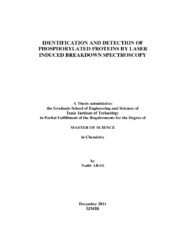Please use this identifier to cite or link to this item:
https://hdl.handle.net/11147/3173| Title: | Identification and Detection of Phosphorylated Proteins by Laser Induced Breakdown Spectroscopy | Authors: | Aras, Nadir | Advisors: | Yalçın, Şerife | Publisher: | Izmir Institute of Technology | Abstract: | Laser-Induced Breakdown Spectroscopy (LIBS) is an optical atomic emission spectroscopic technique that uses an energetic laser source to generate a luminous plasma. Spectrochemical analysis of the light emitted from the plasma reveals information about the elemental composition of the sample. Phosphorylation is an important regulatory mechanism that activates or deactivates many proteins and enzymes in a wide range of cellular process. Identification and detection of phosphoproteins have a crucial importance in phosphopeptide mapping. This study is based on the assessment of the capabilities and limitations of LIBS as a quick and simple method for in-gel identification and determination of phosphorylated proteins, specifically casein and ovalbumin before mass spectrometric analysis for the elucidation of phosporylation sites. For this purpose, an optical LIBS set-up was constructed from its commercially available parts and the system was optimized for LIBS analysis of polyacrylamide gels. Nd:YAG laser operating at 532 nm wavelength and at 10 Hz frequency was used to create plasma on dry gel surfaces. Emitted light from a luminous plasma was analyzed and detected by an Echelle type spectrograph containing Intensified CCD, detector. With this study, LIBS detection of phosphorous proteins after electrophoretic separation of phosphorylated proteins has been shown, for the first time. After SDS-PAGE gel separation process, phosphoproteins were recognized from prominent P(I) lines (at 253.5 nm and 255.3 nm) in a plasma formed by the focused laser pulses on the gel, just in the center or in the vicinity of the electrophoretic spot. Spectral emission intensity of P(I) lines from LIBS data has been optimized with respect to laser energy and detector timing parameters by using standard Na2HPO4. It has been shown that phosphorylated proteins (casein and ovalbumin in mixture) can be identified by LIBS after both coomassie brilliant blue and silver staining procedures. Technique shows a great promise in microlocal spotting of phosphorylated proteins in gel before MS analysis for the determination of the phosphorylation sites. | Description: | Thesis (Master)--Izmir Institute of Technology, Chemistry, Izmir, 2011 Includes bibliographical references (leaves: 53-56) Text in English; Abstract: Turkish and English x, 56 leaves |
URI: | http://hdl.handle.net/11147/3173 |
| Appears in Collections: | Master Degree / Yüksek Lisans Tezleri |
Files in This Item:
| File | Description | Size | Format | |
|---|---|---|---|---|
| T000988.pdf | MasterThesis | 1.26 MB | Adobe PDF |  View/Open |
CORE Recommender
Page view(s)
396
checked on Jun 16, 2025
Download(s)
176
checked on Jun 16, 2025
Google ScholarTM
Check
Items in GCRIS Repository are protected by copyright, with all rights reserved, unless otherwise indicated.